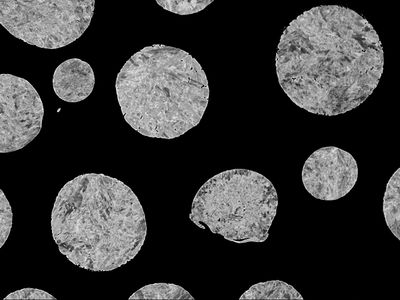Fabrication of metallic powders and methods for their characterisation. Compaction and sintering of ironbased powder and cemented carbide powder. Compaction by uni-axial and isostatic pressing and the use of pressing aids. Thorough analysis of chemical equilibria and diffusion processes during sintering of sinter steel and cemented carbides. Sintering theory and the influence of different processing conditions, wetting and surface diffusion. Solid phase as well as liquid phase sintering are exemplified by applications on sinter steel and cemented carbides. Advantages and limitations of powder metallurgy materials are discussed from technical and economical point of views.
MH2100 Powder Metallurgy 6.0 credits

This course provides the students with knowledge about the field of powder metallurgy and teaches them generic principles associated with creating powders and fabricating engineering shapes from those powders.
Topics covered are powder production and characterization, compaction and shaping of powder, full-density process such as additive manufacturing and hot isostatic pressing, liquid and solid state sintering. Special focus is on additive manufacturing, cemented carbides and steels.
Information per course offering
Choose semester and course offering to see current information and more about the course, such as course syllabus, study period, and application information.
Information for Autumn 2026 Start 26 Oct 2026 programme students
- Course location
KTH Campus
- Duration
- 26 Oct 2026 - 11 Jan 2027
- Periods
Autumn 2026: P2 (6 hp)
- Pace of study
33%
- Application code
10013
- Form of study
Normal Daytime
- Language of instruction
English
- Course memo
- Course memo is not published
- Number of places
Min: 10
- Target group
- Open for application for TTMVM1-2. Elective for all programs, provided that the course can be included in the program.
- Planned modular schedule
- [object Object]
- Schedule
- Schedule is not published
- Part of programme
Contact
Course syllabus as PDF
Please note: all information from the Course syllabus is available on this page in an accessible format.
Course syllabus MH2100 (Autumn 2019–)Content and learning outcomes
Course contents
Intended learning outcomes
After the course the student should be abel to:
- about powder metallurgical materials and their fabrication processes.
- of materials of special importance for the Swedish PM-industry.
Literature and preparations
Specific prerequisites
The course or a similar one like:
MH2027 Micro and Nano Structures.
Literature
Anges i kurs-PM, vid kursstart.
Examination and completion
Grading scale
Examination
- TEN2 - Written examination, 4.0 credits, grading scale: A, B, C, D, E, FX, F
- LAB2 - Laboratory Work, 2.0 credits, grading scale: P, F
Based on recommendation from KTH’s coordinator for disabilities, the examiner will decide how to adapt an examination for students with documented disability.
The examiner may apply another examination format when re-examining individual students.
If the course is discontinued, students may request to be examined during the following two academic years.
Examiner
Ethical approach
- All members of a group are responsible for the group's work.
- In any assessment, every student shall honestly disclose any help received and sources used.
- In an oral assessment, every student shall be able to present and answer questions about the entire assignment and solution.